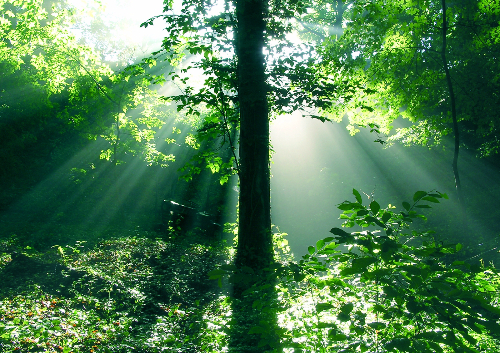
"If a tree falls in the forest, and hits a mime, does anyone care?"
Gary Larson
Shhh! Quiet!
Have you been hiking lately? Where'd you go? Red River Gorge? The Smokey Mountains? Yosemite? In the last 10 years, have you ever experienced a place devoid of all human sounds? Gordon Hempton, an Emmy-Award-winning recordist, claims there are less than a dozen places left in the continental U.S. that are "quiet." Hempton defines "quiet" as a natural environment that has no human-intrusion sounds for at least twenty minutes.
In 1984, Hempton, who has been recording nature sounds since the mid-1970's, identified 21 locations in his home state of Washington that were "quiet." By the early 90's, there were only 3 places left, one of which is tucked away in Olympia National Park. He won't reveal where the other two are. Sadly, he believes there are no quiet places left in Europe.
The documentary
Sound Tracker follows Hempton in his quest for these quiet places throughout the Pacific Northwest. His efforts over the last 25 years to preserve the sounds of nature have culminated in his campaign "One Square Inch of Silence." He seeks to identify and protect places that are totally free of human sounds. The focal point is that place in Olympia National Park's
Hoh Rain Forest, which is marked by a small red stone given to him by an elder of the Native American Quileute tribe.
About five years ago, I took a portable recorder on a hike into the Red River Gorge. I wanted to capture long periods of natural ambience for my sound effects archives. It was a flop. You'd be surprised how often a plane or jet flies overhead, a loud muffler guns it up a hill, someone yells or whistles, or - gasp - a gunshot goes off. As anyone who has worked outside on location knows, it's nearly impossible to have even thirty seconds of silence.
The only time I can remember being out of earshot of any human for an extended length of time was on an island beach off the Gulf coast of Florida. This was in the late 1980's on a weekday before the tourists showed up. The loudest sound I heard was a flock of flamingos taking off. After about 20 minutes, the sounds of "civilization" started to ruin my solitude.
With all the debate over environmental pollution, sound is rarely included in those discussions. Maybe it's about time to address it. Airplanes, sirens, loud cars, loud traffic, loud music, generators, ships, trains - you name it, we have more of them. And coming to a quiet place near you, drones. The next generation of humans may never get to experience "quiet places." If they do, it might frighten them.
More about Sound Tracker Excellent article and interview with Gordon Hempton in The Sun
Did You Know?
- Gordon Hempton won an Emmy for his PBS documentary Vanishing Dawn Chorus.
- Why does Hempton define "quiet" as 20 minutes? It's the approximate length of a 7" reel of analog tape running at 15 inches-per-second.
- Before digital recorders, Hempton captured sounds in the field using a Nagra reel-to-reel portable recorder. The Nagra was considered one of the purest and most accurate reel-to-reel recorders ever produced.
- Studies have shown that noise pollution affects some species' survival rates, especially those that rely on sound more than vision.
- Oceans even have noise pollution from shipping, pipelines, and Navy sonar.
- For decades, people around the earth have complained about low humming sounds. They have been wrongly blamed on power transformers, submarines, pipelines, and fish. But recent discoveries by seismologists point the finger at microseismic reactions from ocean waves pounding the sea floor. Our planet vibrates and hums naturally.
- Birds in rainforests that imitate other sounds have begun to sing like cell phones, chainsaws, and car alarms.
- The Hoh rain forest in Olympia National Park has an average yearly rainfall of 12-14 feet.
- The popular philosophical question, "If a tree falls..." can trace its origins to 1710 from philosopher George Berkeley's A Treatise Concerning the Principles of Human Knowledge. "But, say you, surely there is nothing easier than for me to imagine trees, for instance, in a park [...] and nobody by to perceive them."
- The philosophical question has sometimes been turned into a scientific one, noting that sound is a human experience. Air molecules bumping into each other only become sound if they are captured by a human ear and transmitted to the brain via nerves.
- Some funny twists of the phrase include "If a tree falls in a forest and no one is around to hear it, where are they?" by The Canadian Air Farce comedy troupe; and "If a man speaks in the forest, and there is no woman there to hear him, is he still wrong?" by singer Maura O'Connell.




